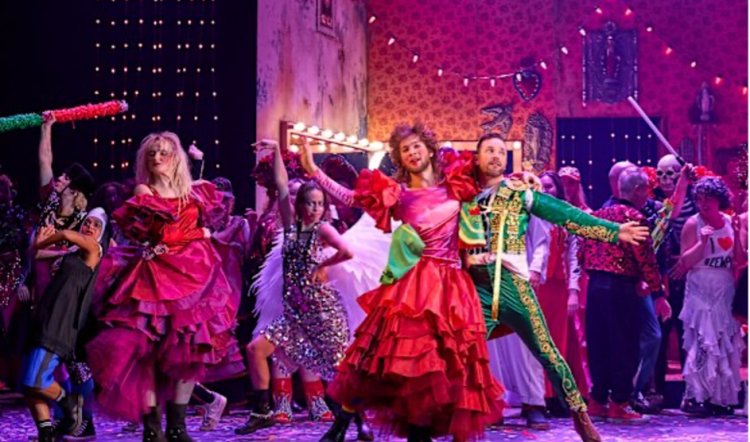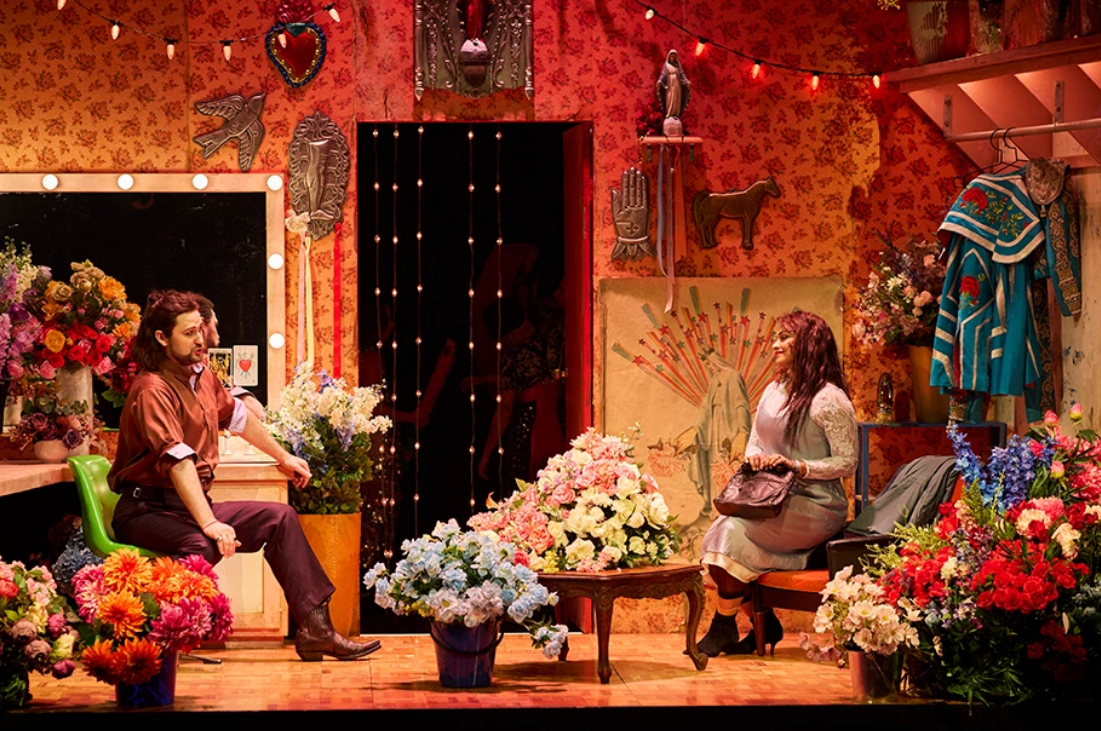
BY DIANA SIMMONDS JULY 14 2025
CARMEN, Opera Australia at the Joan Sutherland Theatre, Sydney Opera House, 10 July – 19 September 2025. Photography by Keith Saunders

In the much-anticipated production of Bizet’s 150-year-old Carmen, under the hands of Melbourne Theatre Company boss Anne Louise Sarks and internationally recognised via Tony and Olivier awards, Marg Horwell (set and costumes), the curtain goes up on a stage dominated by a tall cyclone wire fence. It’s festooned with hundreds of padlocks and colourful ribbons – a lot of troths have been plighted here – while in the foreground is the street life of contemporary Seville. There’s a lot of military khaki alongside working-class clobber, while the women coming off shift from the tobacco factory are clad in overalls. Carmen swaggers in with hers tied by the sleeves around her waist, showing off a body-hugging black tank top. In the gorgeous person of international star, OA debutante Danielle de Niese, Carmen is obviously and knowingly appealing to men and women alike. She’s an arresting presence.
On first night, however, the orchestra and singers were out of sync for some minutes of the opening scene. After a sparkling overture, conductor Lidiya Yankovskaya seemed to have some difficulty bringing her on-stage troops into line with those in the pit. (That this didn’t go unnoticed is perhaps why the traditional applause that greets a successful conductor’s reappearance post-interval was politely tepid rather than enthusiastic.) At the same time, while Sarks is brilliant with close-up and individuals, something is missing here in her handling of crowds. The tedium of daily life for soldiers, townsfolk, and local brats is unfortunately made real in the desultory placing and ennui of those people. So much so that their wooden background presence was comically distracting.
This Carmen works best, and well, in its first and last acts, but it’s a bit of a mishmash in between. This is partially because Horwell has cornered the market in vast quantities of extravagant artificial flowers, plus dazzling fabrics and glitter. All are thrown into the mix with gusto: the principals signified through sequins and lamé and, when party time takes over at Lillas Pastia’s nitery, so does a sort of Day of the Dead fiesta-meets-Sydney Mardi Gras look. Overall, recurrent and provocative motifs are the Virgin – in statuary and pastel portraits – and lots of crucifixes, heretical enough to give a good Catholic conniptions.

Conniptions too in Carmen, as played by de Niese, whose acting is easily as appealing as her voice. This Carmen is a woman aware of and luxuriating in her sensuous appeal and independence. She is a woman of the 21st century like those who demonstrate in pink pussy hats to chants of “Fight like a girl!”, and “Not up for grabs!” And she is not about to simper over would-be alpha beau Don Jose (Abraham Bréton). Unfortunately, as we’re only too aware, women are as likely to suffer violence and death at the hands of their significant others now as at any time in history – probably more so because independent women are an existential threat to so many men, and they simply cannot tolerate it.
Enter Micaela (Jennifer Black), visual and character opposite of Carmen. She loves Jose; she sings like an angel. She brings word from his doting mama. And, with nice morals, her frumpy frock and jacket are a deadly combination. Giving great support are Carmen’s BFFs Frasquita (Jane Ede) and Mercédès (Helen Sherman), while Luke Gabbedy and Kanen Breen are standouts as reprobates El Dancairo and El Remendado. Their presence ensures there’ll be tears before bedtime even if civil rebellion weren’t also in the offing. Then there’s the arrival in town of matador Escamillo (Andrii Kymach).
The trouble with bull fighting, aside from obvious objections, is that a man who can stand, feet firmly planted and not flinch while thrusting the family jewels in the path of a 600kg bull is more alluring than a sulky corporal with mummy issues. And so it is: the power in Carmen is naturally drawn to the power in Escamillo. (As played and sung by Kymach, he’s a grown-up, which is equally appealing.)

Director Sarks restrains the Spanish aesthetic, however, while Horwell’s design is deeply tongue-in-cheek. Consequently, any references to the corrida are passing and sent up – a wicked feminist plot to undercut Iberian machismo, perhaps. The point of this approach becomes clear and effective in the final act when what we now recognise as coercive control and classic misogyny are let loose. Independence and chutzpah are no match for physical superiority. The outcome is inevitable and still shocking.

Leave a Reply